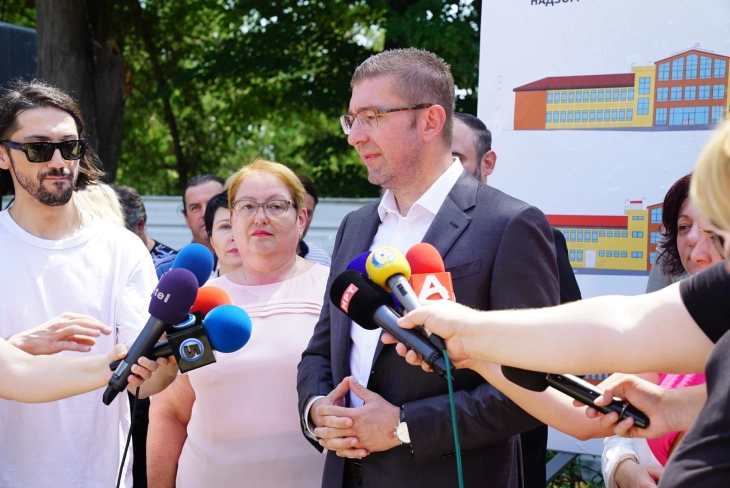Mickoski: Gov't ready for dialogue, no good neighborliness if one side is degraded while the other is exalted
- Prime Minister Hristijan Mickoski voiced readiness on Wednesday to sit down for talks with Bulgarian President Rumen Radev and GERB leader Boyko Borisov, assuming he becomes Bulgaria’s next Prime Minister, but he noted that finding a solution is a two-way street and there cannot be good neighborliness without mutual respect. It’s not good neighborliness, he stressed, if one side is degraded, while the other is exalted.
- Post By Angel Dimoski
- 15:44, 26 June, 2024

Skopje, 26 June 2024 (MIA) - Prime Minister Hristijan Mickoski voiced readiness on Wednesday to sit down for talks with Bulgarian President Rumen Radev and GERB leader Boyko Borisov, assuming he becomes Bulgaria’s next Prime Minister, but he noted that finding a solution is a two-way street and there cannot be good neighborliness without mutual respect. It’s not good neighborliness, he stressed, if one side is degraded, while the other is exalted.
“I regret that messages like these are coming from our eastern neighbor. I thought that such anachronous messages belong to the Middle Ages, but unfortunately it seems that in modern Europe, in the 21st century, there exist politicians like the ones you quoted [Radev]. But despite that, I am ready to sit down and talk with both of them. I hope Borisov forms the Government in Bulgaria because we both come from the European People’s Party, and it is logical for me to wish that our eastern neighbor has a prime minister that comes from the same family. There shouldn’t be any dilemmas over this. But also, my message is that the time of servile politicians in our country, who bent the knee and signed everything that was put in front of them while robbing the citizens in the name of the European flag and shamed and degraded their homeland, has ended,” Mickoski said.
They, he said, should get used to politicians who are working day and night for the good and the future of the citizens and the country. and who are ready to talk on the basis of arguments.
“I am in favor of respecting the treaties, that is a two-way street. I am in favor of building friendly relations with the neighbors, our neighbors are a fact, and we cannot run away from that fact. I am in favor of building bridges, but also respecting each other at the same time. We can’t be good neighbors without mutual respect. It’s not good neighborliness if one side is degraded, while the other is exalted. That’s not good neighborliness, that’s humiliation for one side, and it means the other side hasn’t fulfilled its goal,” Mickoski said.
The Prime Minister said he has reiterated several times that the country has recognized its minorities as early as in the 1940s, including the Bulgarian minority, but pointed to the “gradual assimilation of the Macedonian minority in Bulgaria” and the judgements of the European Court of Human Rights on the issue.
“We don’t dispute the right of our compatriots who feel that way, and that’s a fact. But now let’s see what has been done throughout the history of our eastern neighbor. If you go back to those early 40s and if you look at the censuses carried out during those years and in the early 50s, you will see that several hundred thousand citizens of our eastern neighbor declared themselves as Macedonian. Even in the late 40s, dozens of teachers from Macedonia, in western Macedonia, in the Pirin part of Macedonia taught Macedonians the Macedonian language, Macedonian culture, customs, theater plays were organized. The erasure and the revocation of that right by the Bulgarian authorities then led to frustration and silent assimilation of the Macedonians in the western part of Bulgaria in Pirin Macedonia, and it is sad that this is continuing in the 21st century,” the Prime Minister said.
According to Mickoski, the judgements of the European Court of Human Rights in Strasbourg are an indisputable fact that a Macedonian minority exists in Bulgaria.
“Fourteen judgements by the European Court of Human Rights have been made, showing that Macedonian minority in Bulgaria exists whose right to organize in a nongovernmental organization, not in the Constitution but in a nongovernmental organization, has, unfortunately been made impossible by politicians such as Radev. I urge good neighborly relations, a two-way street, so that we can find a solution together, because as good neighbors, we need to talk on the basis of arguments and facts, and not to politicize this issue, not to reduce it to base passions. Our people have done a lot for their European future, and I expect Europe to give back to them and to this country,” Mickoski said.
Asked if there are any guarantees from Brussels that the issue will be overcome, the PM said the Government’s policy is building bridges with the country’s neighbors.
“Having good neighborly relations - that’s one prerequisite for normal and decent functioning and above all, for ourselves, and we shouldn’t have any dilemmas over this. And as I said, this is a two-way street. We are ready to sit down in Brussels, in Sofia, and anywhere else, in order to talk on the basis of arguments and facts and to talk about the future. In the meantime, if we fail to do so, our job is to focus on solving our domestic tasks and the issues of the people. This is what our policy will be,” Mickoski said.
The Prime Minister stressed that the Government is not running away from a solution, but that the solution must be dignified and a two-way street.







